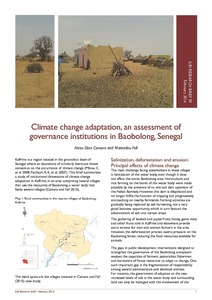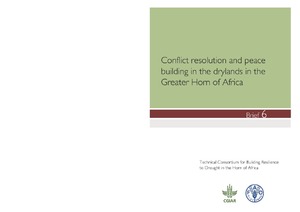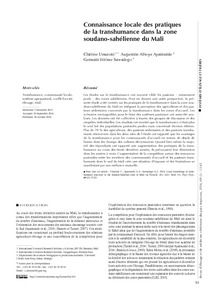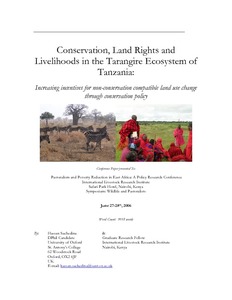Climate change perception and adaptation of agro-pastoral communities in Kenya
Data on agro-pastoralists' perceptions of climate change and adaptation options were collected from agro-pastoral communities in 7 rural districts of Kenya. Key adaptation strategies for livestock producers include mixing crop and livestock production, destocking, diversifying livestock feeds, changing animal breeds and moving animals to other sites. Desired adaptation options include introducing new breeds and increasing herd size. Additionally, the main barriers to adaptation identified include lack of credit or savings followed by lack of access to land and inputs.
Climate variability and impacts on East African livestock herders: The Maasai of Ngorongoro conservation area, Tanzania
East African pastoral adaptation and vulnerability to climate variability and climate change is assessed, using data from decision making processes and ecological data of the Maasai of Ngorongoro Conservation Area as an example. The paper uses integrated modeling, linking PHEWS, a household model, to SAVANNA, an ecosystem model to look at the effects of drought and a series of wet years on the well-being of Maasai pastoralists. Model results suggest that the ecosystem is quite resilient and suggests that the Maasai of the NCA are not very vulnerable to climate variability.
Climate variability and climate change in pastoral systems
Comparative changes in density and demography of large herbivores in the Masai Mara Reserve and its surrounding human-dominated pastoral ranches in Kenya
Conflict management, decentralization, and agropastoralism in dryland West Africa
This paper reports on a four-site study conducted in the Sahelian zone of Niger. The study takes a novel mixed methods approach for understanding conflict management from the perspective of rural peoples by not only describing past highly publicized conflicts but also by analyzing the steps rural peoples follow to management disagreements that arise in their everyday lives. This “bottom-up” approach reveals both a capacity and preference among our informants to manage disagreements informally without involving village or extra-village authorities.
Connaissance locale des pratiques de la transhumance dans la zone soudano-sahélienne du Mali
Les études sur la transhumance ont souvent ciblé les pasteurs – notamment peuls – des zones sahéliennes. Pour en donner une autre perspective, la présente étude a été centrée sur les pratiques de la transhumance dans la zone soudano-sahélienne du Mali en intégrant la perception des agriculteurs et des pasteurs sédentaires concernés par la transhumance dans les zones d’accueil. Les scénarios envisageables pour le futur des systèmes pastoraux ont aussi été analysés. Les données ont été collectées à travers des groupes de discussion et des enquêtes individuelles.










